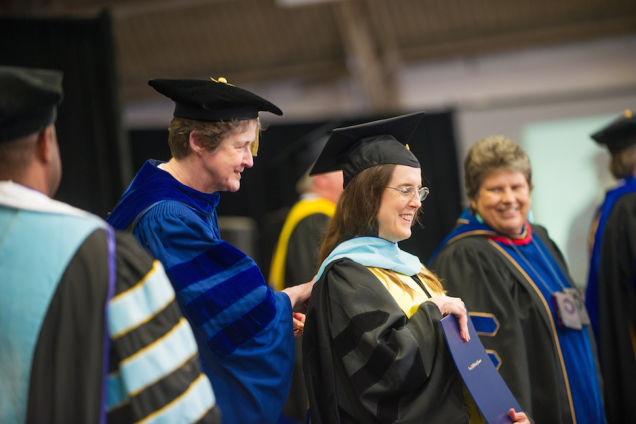7 things that I would like to know about before entering a magistracy / graduate school abroad
- Transfer

Now education abroad is more widespread than ever. Many specialists who want to build a successful career in their field receive a bachelor's degree at a domestic university, and go abroad to enter a magistracy or graduate school.
We offer a translation of an article by Alan Henry, in which he writes about 7 things that he would like to know before entering a magistracy / graduate school.
We hope that Alan's advice will prompt you to useful thoughts and help you draw the right conclusions. Go!
If you, having finished college and having received a bachelor's degree, decide to continue education in a magistracy or graduate school, your life changes a lot. Absolutely in all areas, even where it would not seem to be required, you need to behave in such a way as to be somewhat different from competitors. Sounds familiar? Then we suggest that you familiarize yourself with some tips that we come to understand after getting a degree.
High school (hereinafter referred to by this concept we will mean master's / graduate school) often has a reputation for the most difficult period in the life of a student. Many decide to continue their education after long attempts to achieve career success - often large companies require employees to have a master's degree or work experience. As a rule, those who want to pursue a career in the academic field, as a rule, enter graduate school - the obtained scientific degree allows them to adequately realize themselves in the scientific field.
We offer some tips that we are aware of during and after graduating from high school and which we hope will help you!
Get ready for a huge competition that you have not encountered before

What surprised me the most in high school was how fierce the competition was among my classmates and classmates. All this was much different from the situation in college, where most did not particularly strive for individual work. In high school, on the contrary, my classmates tried to do everything to surpass the rest - both in educational and in social activities.
It’s easy to understand why this is so. Reputation is very important for the future career of a graduate, and to make you in the spotlight takes quite a long time. We can say that studying for a bachelor includes obtaining a diploma and degree. If you decide to continue your education, then you need to prove to the future employer that you can and want to succeed. A high school student must gain really important and useful knowledge and master the skills of communication with people who may be useful for you in the future. Be active and try to stand out in a positive light so that everyone with whom you want to collaborate in the future wants the same.
Of course, healthy friendly competition is great, but when it comes time to collaborate or work together as a team, competition will be completely inappropriate. My classmates competed not only with other groups, trying to surpass them, there were serious disagreements between the members of the same team when it came to choosing the leader of the group. Everyone wanted to be the person who will represent the work done by the whole team. When it came to routine work, for example, summarizing the data obtained as a result of the study, interest usually disappeared.
To become a leader, act carefully and carefully, hone your communication skills with people.
Intelligence is not as important as you think

While you are in college, intelligence is valued very highly. In higher education, and, in truth, after graduation, intelligence, of course, plays a role, but not a key one. This does not mean that you should not be smart - just remember that the knowledge that you have acquired to obtain a certain degree is no longer enough. You may not be the most intelligent and erudite, but you may be - in any case, you should be hardworking, self-confident and have communication skills. You will surely meet people who are inferior to you in the mind, but possess the above skills at a higher level. And you know what? They will be able to achieve more than you, and it's a shame.
Manuel Ebert, the author of the Medium website, shared his thoughts on what he would like to know before entering high school. He really got into the top ten:
While you are young, you spend a lot of time to grow wiser. In fact, an intelligent person who knows how to communicate with other people will be able to graduate from college and high school without having to do much work (although you will have to work on physics).
Congratulations, you are lucky. Although, at the same time, you are not at all lucky. Because while you were able to graduate from school without making any effort to this, others spent their efforts and tried to obtain useful skills that are likely to be useful to them in the future: diligence, perseverance, networking.
In our society, intelligence is usually overestimated. When I tell people that I worked in neurology, often the first thing I hear is: “Wow, you are probably very smart.” Of course, I'm not a complete fool, but I know many people who are much dumber than me, but have achieved great success in neurology.
Of course, high intelligence will open many doors for you. But you cannot get a job only with his help. Diligence, punctuality, the ability to establish valuable connections - these are the qualities that are necessary not only for an engineer engaged in software, but also for representatives of all professions, without exception, located outside the soap bubble called "higher school".
The conclusion, of course, is to develop these qualities in yourself as early as possible - ideally, of course, even before entering a higher school, but it is never too late to start. Often, self-confidence, perseverance, hard work and perseverance will help you achieve greater success than any other set of qualities. At the very least, they will give you the opportunity to chat with people whom your intellect can really impress - that is the secret.
Do everything to make good connections: this is what you are here for.

Surely you have heard this advice before: attend as many additional events as possible: attend seminars and lectures by invited specialists, attend optional classes, participate in group trips, join student communities, and offer help to professors who need assistants. If you do all this, then achieve the main thing: meeting new people with whom you can later establish valuable contacts.
Finally, and this is perhaps the most important thing - you will make friends. Closer than those you met in college. Now you are not only a much more mature person, but also a more determined, interested person in a future successful career with longer-term goals. You already understand life enough not to waste time on people who pull you down and devastate you emotionally (or financially). Learn from your mistakes while studying in college and do not allow them in the future - get closer to those people who are really important to you at every stage of life.
One of the authors of Lifehacker, Thorin Klozowski, who also studied in high school, told me the following:
Especially in the case of the humanities, higher education is more an opportunity to meet new people than to increase the level of knowledge. Therefore, make sure that you have time to get acquainted, communicate with different people, to establish contacts with as many people as possible. You can contact them during the implementation of your postgraduate projects, and they will do the same.
Do everything in your power: this applies to bachelors, but it seems to me that additional activities in higher education play a much more significant role than during college.
Thorin focuses on the humanities, but I can say the same thing in the case of the natural sciences and business education. If you plan to continue your education at a higher school, go to work in a laboratory and fight for authorship, or intend to enter a business school to study management technology, be prepared to constantly be in working mode. Try to find an approach to the people around you, collaborate with them, help them and do not hesitate to ask for help in return. Use every opportunity to meet and chat with as many people as possible.
Leave your comfort zone behind

Leave your comfort zone behind. It can be difficult - in my case, it was really very difficult - however, you should be prepared for this. Nobody will force you to attend the lectures of invited specialists or travel to other cities to attend the conference and chat with interesting people. No one will insist that you go to study abroad or work in another laboratory for a while to share your experience and learn something new.
You can stay at home, lie on the beach and ignore all of the above activities simply because it is easier.
Do not do so!
Such opportunities do not appear every day, and the later they appear, the more difficulties they cause. Try to embrace as much as possible and learn how to correctly allocate time. In your future career, you may not achieve what you want (or just stay overboard) if you do not work in the laboratory or attend a conference. If you want to achieve the maximum and therefore decide to continue education, you need to destroy your internal framework and begin to develop.
Learn from guest speakers and professors. Make contacts with them. Many teachers are happy to communicate with future masters or graduate students and stay in touch even after graduation. If you have the opportunity to travel and watch real experts in your field, do not miss this chance simply because "this week I have no mood to go somewhere." Subsequently, you will regret it.
Use the stereotype of “poor student” for your own good, even if you are not

Surely you are familiar with the stereotype of a poor high school student. This is often true. However, even if you have something to feed yourself, and you do not have to eat instant noodles and frozen vegetables, sometimes it is better not to refute this stereotype. We are not talking about the fact that you need to stop enjoying a decent standard of living and delicious food if you can afford it, but the image of a tidy and modest student who is content with a small student will do you a good job later, when loan and credit bills start to arrive .
Even if you are so lucky that you can avoid repayments on a loan, you will be much happier if, while studying at a higher school, you will correctly allocate your funds instead of collecting a huge amount of student loan and card debt simply because you have been leading an image life that they could not afford. For example, I worked in my alma mater for several years full time, while getting a degree, so I did not have to pay for training (if you have the same opportunity, use it). However, over the years that I did not work, I managed to accumulate a certain amount of debt on a student loan. Many people believe that they will receive a well-paid job immediately after graduation, and their debts or loans will immediately be a thing of the past. This may not always happen (more on that later), so you should not have empty hopes. Proper distribution of funds will make your graduation much happier.
Keep textbooks and find your field.

High school is an opportunity to find a field or a specific area in which you will specialize. Unlike a bachelor's degree, in which you are given the most advanced education, in master's and postgraduate studies you delve into a specific field and study it at a much higher level. You should not just go with the flow - take the time and choose what really interests you. Ideally, this area should be related to your future career.
When you find your field, make contacts with as many people as possible related to it. If you specialize in a specific topic, you will probably find out where the best studies are conducted on this topic, and with whom at the university you can talk about your specialization. Talk with specialists in your area - offer to work in their laboratories or help with the research. Ask, maybe you can be useful in some projects - in general, express your interest. If they teach in your course, find out if you can become their assistant or help teach, for example, bachelors (if possible).
Keep your textbooks. I know that after graduation many of us want, first of all, to get rid of books. I agree with this desire only if we are talking about undergraduate studies. Textbooks remaining after studying in a magistracy or graduate school must be stored - they are usually highly specialized and often contain important information (and sometimes the only one) on a particular topic. You may never need a textbook on mathematical analysis from the first year, but you will definitely find application for business books that lie on the same shelf as studies on transnational corporations and international law.
Do not build empty expectations

After you finally received a master’s or Ph.D. degree, you should not expect that at that moment money will pour down on you from heaven, high standing in society, etc. Just because you have a new MBA graduate diploma means that immediately after graduation you will be hired for a well-paid job. In the case of the natural sciences, the fact that you just got a degree just means that you have to compete with all candidates who graduated in the same year for a place in the laboratory. To get a vacant position, you still have to work hard.
If you manage to make useful contacts, the importance of which we mentioned earlier, the process is greatly simplified. Your business school colleagues may be familiar with the leaders of some companies, or they may decide to start their own business. The professors you worked with can arrange for you in your laboratory or write recommendations to help you get to work in a large institution. However, you should not expect that you will get everything without putting effort into it - you need to work hard to get a good job.
Thorin advises:
Do not expect that while studying in a master's or postgraduate course, what you want to achieve will simply fall on you. Most humanitarian programs are designed to teach you how to learn and think in the right direction. If you decide to continue your education in order to carry out some grandiose project yourself or just for the sake of self-satisfaction, you will be disappointed. Instead, you will end up learning with even more questions about the world around you, BUT you will at least be able to better understand and explain your path in it. It seems to me that in the case of graduate and postgraduate studies it is much more important to choose a school, atmosphere and a suitable program than in the case of undergraduate studies. Your general view of the world and how and what you think about it will often depend on the program you prefer,
Higher school includes not only education, but also work and networking. If you enter graduate school or graduate school next year, I hope these tips come in handy.
Studying at a higher school can be exhausting, stressful and really difficult, or even easier than getting a bachelor's degree - it all depends on what goals you set for yourself, what you are striving for and what you want to achieve.
Good luck!
PS If you are interested in the topic of studying abroad, we can recommend articles on admission to a North American university or a master's program in Germany .
